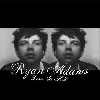RYAN ADAMS : LOVE IS HELL
- Political Scientist
- Afraid Not Scared
- This House Is Not for Sale
- Anybody Wanna Take Me Home
- Love Is Hell
- Wonderwall
- The Shadowlands
- World War 24
- Avalanche
- My Blue Manhattan
- Please Do Not Let Me Go
- City Rain, City Streets
- I See Monsters
- English Girls Approximately
- Thank You Louise
- Hotel Chelsea Nights
Label : Lost Highway
Release Year : 2004
Length : 68:01
Review (AllMusic) : Like any Ryan Adams album, Love Is Hell comes with a back-story, one that is carefully calculated to construct the enfant terrible's self-myth. Love Is Hell was intended to be the official follow-up to 2001's Gold - the album that was not a collection of demos (that was 2002's Demolition), or the recorded-but-shelved albums 48 Hours or The Suicide Handbook, or even his alleged song-by-song cover of the Strokes' Is This It. Longtime Smiths fan that he is, Adams teamed up with John Porter - the man who produced The Smiths, Meat Is Murder, and part of The Queen Is Dead - with the intention of creating his own mope-rock album, hence the title Love Is Hell. Americana label that it is, Lost Highway balked at releasing a stylized tribute to Mancunian rainy-day bedsit music and didn't release it, encouraging Adams to record a different album, presumably one more in line with the label's taste. In the press and on the web, our hero spread stories about how the label claimed it was "too depressing" and "dark," thereby cultivating the myth that he's a maverick genius, while the label cheerfully countered with the defense that it just knew that our boy could do better. Eventually, a compromise was arranged: Adams kicked out a new album, the self-descriptive Rock N Roll, while releasing the equally self-descriptive Love Is Hell as two EPs, the first hitting the streets the same day as the "official" album, the second arriving a month later. Five months after that, the full-length Love Is Hell, containing both EPs plus "Anybody Wanna Take Me Home" from Rock N Roll, was released, negating the worth of the individual EPs (which were, after all, merely two halves of one album) and likely irritating legions of fans who bought both EPs. While it took longer than necessary to have the whole bloody affair of Love Is Hell released as its own entity, it's hard not to view it as a companion piece to Rock N Roll, particularly because they're two sides of the same coin. In effect, both Rock N Roll and Love Is Hell are tribute albums, each a conscious aping of a style and sound, both designed to showcase how versatile and masterful Adams is. But since he's a synthesist more than a stylist, Adams, for all his bluster, winds up as a Zelig-styled character, taking on the characteristics of the artists he's emulating - something that can be sonically pleasurable, but far from being the substantive work of mad genius that he relentlessly sells himself as. If Love Is Hell has the edge over Rock N Roll, it's because it's more carefully considered in its production and writing, and he manages to hide his allusions better than he does on Rock, where every title and chord progression plays like an homage. Here, he shoots for the Smiths and winds up in Jeff Buckley territory tempered with a dash of Radiohead circa The Bends. To claim that it is a dark affair is to criticize its milieu more than its substance, because the songs have the form and feel of brooding, atmospheric mope-rock, not the blood and guts of the music. Adams is fairly adept at crafting that mood - anybody who's such a fan of rock history should be - sometimes relying more on a blend of attitude and atmosphere instead of songwriting. Such is the fate of a stylized tribute to a style with specific sonic attributes, but Adams also does come up with a clutch of effective songs: the epic sprawl of "Political Scientist," which captures him at his best Buckley; the title track, which is nearly anthemic with its ringing guitars; the understated "World War 24"; the gently propulsive "This House Is Not for Sale," which would fit nicely between a Julian Cope and Morrissey track on a college radio show from the late '80s. "English Girls Approximately" is an effective Bob Dylan and Paul Westerberg fusion, and the closer, "Hotel Chelsea Nights," is one of his best songs, a mildly anthemic soulful anthem with vague overtones of "Purple Rain." Nevertheless, it's telling that the best song here is a cover of Oasis' "Wonderwall." It's a well-done cover but not much of a reinvention - Adams uses Noel Gallagher's solo acoustic version of the song as a template, replacing strumming with fingerpicked guitars and altering the phrasing slightly - which is why the song itself shines through so strongly: it resonates how the other songs are intended to, but don't. While it doesn't fatally hurt Love Is Hell, since it is an effective mood piece, it does undercut it, revealing how Adams delivers the sizzle but not the steak.
